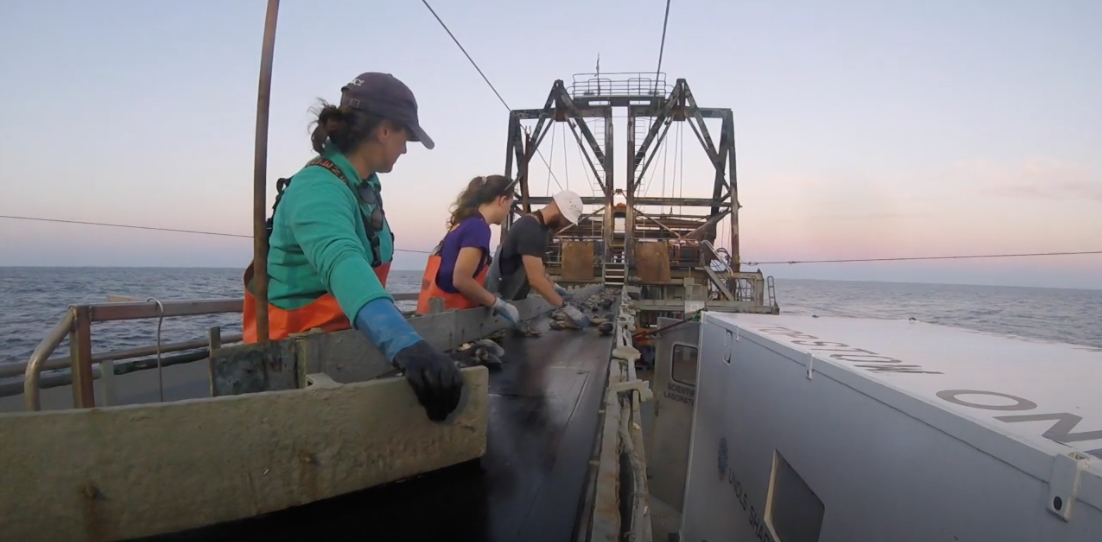HATTIESBURG, MS / ACCESSWIRE / July 21, 2022 / Climate change is now affecting long-standing patterns for marine life, with warmer waters pushing species out of their traditional habitats and into newer areas. As these changes become increasingly common, they will create challenges for fishermen, scientists, and regulators. A team at the Science Center for Marine Fisheries (SCEMFIS) is examining the extent of the problem on two key shellfish species: surfclams and ocean quahogs.
Ocean quahogs, one of the longest-lived marine species on Earth, inhabit cold waters in the Mid-Atlantic; surfclams, in contrast, have traditionally inhabited warmer areas. With climate change, surfclams' traditional habitats have become some of the fastest-warming waters in the region, forcing them to move north into the colder waters traditionally occupied by quahogs.
"The area of overlap is getting potentially larger and larger as the Middle Atlantic warms, because one species is moving in, and the other one hasn't quite got the message and moved out yet," said Dr. Roger Mann of the Virginia Institute of Marine Science, one of the lead scientists on the survey.

In the fall of 2021, a team from SCEMFIS partnered with an industry fishing vessel, the F/V Pursuit, to document the extent of this habitat overlap. They took samples in several areas, working through surfclam and ocean quahog habitats, as well as areas of intermingling in between. The team documented what was caught, its species, size, age, and location.
After analyzing the data, the team found significant habitat overlap and intermixing between surfclams and ocean quahogs, much more than was expected at the start of the survey.
"One of the surprises though was just how extensive the overlap is now," said Dr. Eric Powell, of the University of Southern Mississippi, another one of the survey's lead scientists. "This is a major community shift on the continental shelf and it's something that the management agencies and the fishery are going to have to get their arms around and deal with."
Intermixing of ocean quahogs and surfclams is just the latest example of how climate change is creating new problems for fishermen. Under current rules, fishermen are not allowed to harvest clams and quahogs at the same time. In an environment where these species inhabited separate parts of the ocean, these rules were easy for fishermen to comply with. But climate-influenced migration is making harvesting these species much more challenging, a problem that will only increase in importance as trends continue.
"As bad as it is, it's going to be much worse in five years, in my opinion," said Dr. Powell. "The challenge, both to the fishery and management, is to figure out how to revise the regulations so both of these species can be landed without causing a problem with the inherent stability of the fishery and management."
"The information that we get is vitally important to us staying not only a sustainable fishery, but also a fishery in good stead with enforcement," said Guy Simmons, Senior Vice President at Sea Watch International, which harvests clams and is a member of the SCEMFIS Industry Advisory Board.
About SCEMFIS
SCEMFIS utilizes academic and fisheries resources to address urgent scientific problems limiting sustainable fisheries. SCEMFIS develops methods, analytical and survey tools, datasets, and analytical approaches to improve sustainability of fisheries and reduce uncertainty in biomass estimates. SCEMFIS university partners, University of Southern Mississippi (lead institution), and Virginia Institute of Marine Science, College of William and Mary, are the academic sites. Collaborating scientists who provide specific expertise in finfish, shellfish, and marine mammal research, come from a wide range of academic institutions including Old Dominion University, Rutgers University, University of Massachusetts-Dartmouth, University of Maryland, and University of Rhode Island.
The need for the diverse services that SCEMFIS can provide to industry continues to grow, which has prompted a steady increase in the number of fishing industry partners. These services include immediate access to science expertise for stock assessment issues, rapid response to research priorities, and representation on stock assessment working groups. Targeted research leads to improvements in data collection, survey design, analytical tools, assessment models, and other needs to reduce uncertainty in stock status and improve reference point goals.
PRESS CONTACT:
Stove Boat Communications
john@stoveboat.com
SOURCE: Science Center for Marine Fisheries
View source version on accesswire.com:
https://www.accesswire.com/709373/Climate-Change-Creating-New-Conflicts-for-Surfclam-Ocean-Quahog-Fisheries-as-Warming-Forces-Habitat-Shifts













